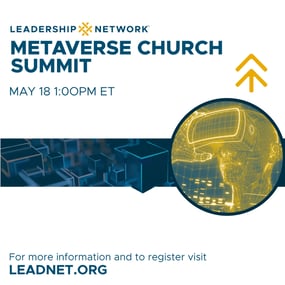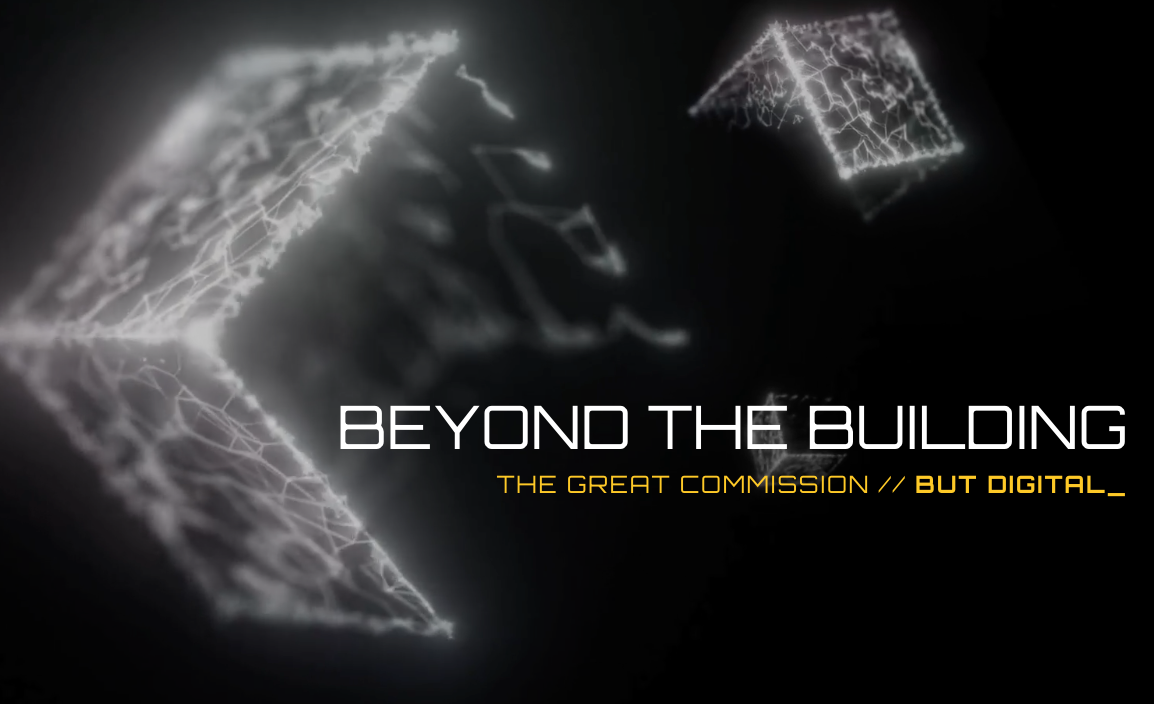This article was originally published on Leadership Network. For more information on LN's work on churches in the metaverse, check out Metaverse Church NEXT.

Things have changed a lot in the past twenty years. I graduated from college in December 1999, just in time for Y2K (remember all that noise around Y2K?) and honestly, ever since then it feels like advances in technology have been rampant. What’s suspect is that advances in technology seem to be coming at an increasing rate, but also increasingly seem to be impacting culture.
WEB 1.0: BACK WHEN INFORMATION WAS ENOUGH
About the time Y2K was supposed to destroy the economy as we know it, Web 1.0 was at its heyday. Otherwise known as the “World Wide Web” or “The Information Age,” Web 1.0 really lasted from 1989-2005. Remember all those AOL CDs you’d get in magazines, or going to AskJeeves for search? It was incredible the amount of information stored in the Internet, and at least as a kid going through school in the Web 1.0 era, the information was useful. (In my entire college career 1995-1999, I never once checked out a book from the college library.) People would go to their Netscape browser, and find unrealized information like never before. Let’s be real, has anyone ever bought an encyclopedia set or atlas since the birth of the internet? As technology expanded, culture moved past Web 1.0, embracing new parts of the technology. As we’ll find out, culturally, content wasn’t enough. We wanted community.
WEB 2.0: WHEN STANDARDIZATION WAS A GOOD THING
Come 2004, new tech companies like Facebook were gaining popularity, and with that the dawn of social media, and community online. Web 2.0 brought with it advances in new technologies like audio and video, which made it easier for people to converse online. Instead of paying ridiculous long-distance rates to a telephone company, we started utilizing Web 2.0 technologies to communicate. Our phones stopped being talking devices and moved to typing devices. As a result of the increase of usability, Web 2.0 technologies saw an increase in adoption rates over their 1.0 predecessors.
What’s interesting in Web 2.0 technologies is that the technology started impacting culture overall. Example: Web 2.0 brought out terms like standardization, in hopes of keeping interacting with technology simple or clean. Twitter would only let you post 160-character micro-posts. Instagram required a photo to post on everything. Remember Vine? You had six seconds to communicate on a video clip. Web 2.0 impacted culture in big ways, bringing not only community, but the idea of standardization of content to people through these little devices in our pockets called smartphones. As a result, the perception of people even became “standardized,” or at least the assumption that people are the simplified, stereotypical expressions of their race, age, etc.
Web 2.0, in its infancy, brought “trust” to culture. Think back to 2010, or 2015 even. We trusted online sources, we valued people online. I don’t know if we can really say that in 2022. Which brings us to Web 3.0.
WEB 3.0: TO BE DETERMINED
What is Web 3.0? History books will tell it best, but from our seat in 2022 it’s the Age of Experience meets a decentralization worldview. Virtual reality, augmented reality, mixed reality. Even artificial intelligence fits in here as the metaverse works to fine-tune our experiences online.
Web 1.0 brought us text on a digital page.
Web 2.0 brought us video in community.
Web 3.0? Environments? Worlds? Universes?
With Web 3.0, 3D graphics are bringing people an opportunity to experience life like no other. Recently I had a conversation with a CEO of a successful Christian technology firm, and the gist of the conversation was focused on, “What do we do when virtual reality (VR) becomes a better experience, a better life, than what we have in physical reality?” (Great question, by the way. We’ll answer that later.)
As impactful as VR is (and augmented reality will be), I truly believe that the strength of technology is not just in these immersive worlds or experiences. I think the greatest impact the metaverse will feel is in the decentralized culture in response to blockchain and crypto-currencies.
FOR EVERY ACTION THERE’S AN EQUAL AND OPPOSITE REACTION
With Web 2.0, there was a lot of trust in people online. But over time, Web 2.0, and people utilizing many social media platforms, began to struggle with these technologies. Remember when the digital standardization of people started causing people to get treated like their stereotypical self? Web 2.0’s standardization caused our technology in many ways to lose context. Towards the end of Web 2.0, indirectly, we hear of echo chambers where social media algorithms only feed users posts from similar people. Directly, we see where people take political opinion or racial animosity to social media. The boiling pot of these social communities in many ways comes down to either a yes or no in key areas, and that defines who you are perceived to be, not who you are.
THE DEFENSE OF DECENTRALIZATION
As a result, people will walk away from social media. But Web 3.0 already has a defense mechanism in place: decentralization. In the past I’ve talked about how there will never be another Beatles, because now there are 30 sub-genres of rock music. The truth is, people are fighting so hard against standardization, that they’ve actually created 30 different styles of just rock music. Wow. The idea of centralizing all rock-and-roll fans under the banner of The Beatles today, it would never happen. Welp! The last thing we’ve seen close to that was probably U2, and we can thank social media for that.
In Web 3.0 culture, I believe you’re going to see a swing back towards smaller churches being more popular. Why? Because of a lack of trust in pastors because of moral failure or political differences. We’re already seeing this now as Barna reports that 43% of active church attenders say they do not strongly trust their church leadership. People will begin looking for a church community, not based on location, but based on beliefs. In addition, and this will be an ongoing conversation, decentralization of church will take people to the place where they’re no longer meeting in that “centralized” building, but instead, creating their own expressions of church that align with their own values (which may or may not align to Biblical values.)
WHAT’S THE POINT?
I was talking with a Pastor recently about moving his church into the metaverse. His answer was kind of surprising: “Jeff, we’re really still a 1.0 church. We’ve not even figured out how to do the 2.0 stuff well. There’s no way we can handle the 3.0 metaverse.”
Pastors out there who feel this way, I respect your position. I respect the transparency you’re showing.
What can we do? I don’t know if there’s a wrong answer, necessarily, but if there is a wrong answer it’s probably “I’m just going to stay a 1.0 church.” Technically speaking, you can still do these things. You can still launch a webpage that aims at getting people connected to your building. Your challenge is that your 1.0 church is operating in a 3.0 culture who is looking at organizations like churches much differently today than they were 20 years ago.
A 1.0 church will keep the people they have, but will likely struggle to grow, because culture/society has moved on to a 3.0 mindset of decentralization. A 3.0 church will reach a different type of person than the buildings reach, because they’re recognizing the need to decentralize what’s happening in the church, and the potential to utilize multiple modes/models of church to reach different types of people through the church. A 3.0 church will also recognize that the idea of community has shifted, and with it the understanding of “the gathering” and what it means. A 3.0 church will not see decentralization as a threat. They will see it as an opportunity to reach, engage, disciple, and release people in a new way. That new methodology doesn’t have to involve virtual reality, as much as it involves a mindset.
The challenge before us, the Church, is not understanding all the tech behind these Web 3.0 technologies, but the cultural implications that are happening as a result of these technologies. We cannot fall back on being a church for the Information Age! Culturally, the people we’re trying to reach are way past that.

 Join
Join 



Comment